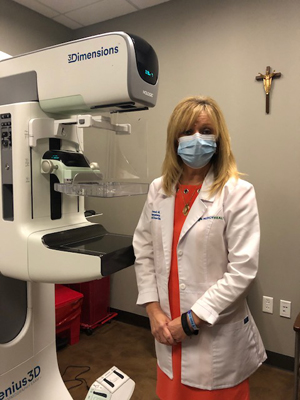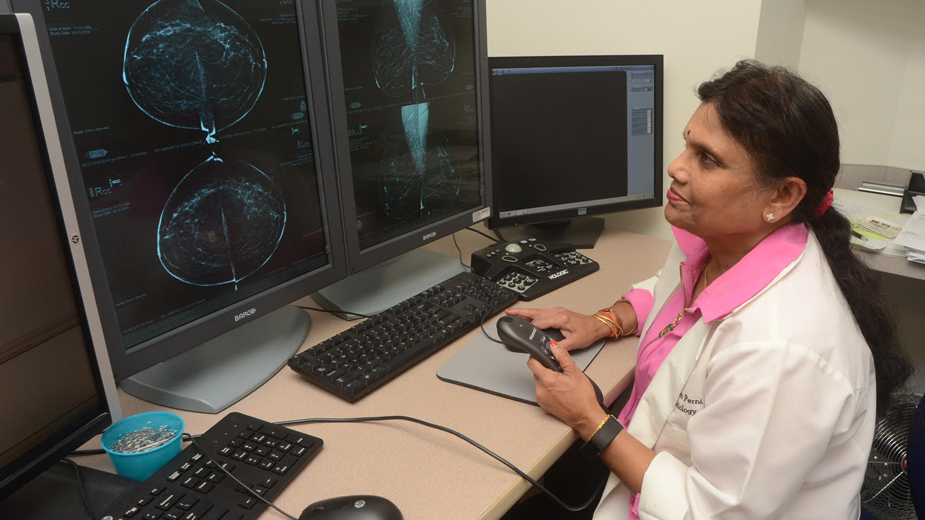YOUNGSTOWN, Ohio – Even with health concerns raised by the coronavirus pandemic, breast cancer care providers in the region stress that women need to get checked.
While health-care centers have enacted safety protocols to help to protect patients and physicians, cancer care providers remain concerned that some women could be staying away over the possibility of contracting COVID-19.
Screening for breast cancer “is as important today as it was prior to the pandemic,” says Juli Dulay, manager of the Joanie Abdu Comprehensive Breast Care Center in Youngstown. Last year, the center diagnosed 196 cancers.
“In this time of COVID, we don’t want people to wait to get their mammogram because they’re fearful and they don’t want to go out of the house,” says Angela Kerns, chief nursing officer at the Surgical Center at Southwoods, Boardman.
Kerns reports one in eight women will develop breast cancer during their lives. “That’s a staggering statistic,” she says. In Ohio, it is the fourth-highest cause of death, which emphasizes the importance of focusing on mammography and screening.
“Cancer patients need timely diagnoses and treatment in order to provide the best outcome. So it was imperative that we find ways to keep the doors open to provide the needed services,” says Lyn Pethtel, director of quality improvement and infection control at Salem Regional Medical Center.
Although services were available, however, the pandemic may have scared some women, even if they felt a lump, from seeking help or treatment, says Dr. Maryann Payne, breast surgeon at Trumbull Regional Medical Center in Warren and Sharon Regional Medical Center in Sharon, Pa. When a cancer is identified, “you want to take care of it as fast as possible,” she says.
“There definitely was a concern among patients,” Payne says. While concerns about COVID-19 didn’t stop “the patients that we were seeing because they wanted to proceed with the workup and surgery as quickly as possible,” patients in general “were afraid to go into the hospital or seek care because of the pandemic and the risk of contracting the illness,” she says.
“By doing screening, we found a lot of small cancers. That’s the good thing of doing mammography,” says Dr. S. Lakshmi Perni, diagnostic radiologist and director of the Steward Center for Breast Health in Austintown. “We have to catch it when it’s very early, when it’s curable.”
In some cases, during April and May, patients called to cancel or just didn’t show up, she says.
“Our overall goals have always been safety, high-quality care and very efficient, effective care,” Dulay says. “Those goals have not changed but certainly the pandemic has impacted the way that we practice.”

Early in the pandemic, hospitals in the region limited nonessential services, including routine mammograms. Diagnostic mammograms, conducted when a patient or physician detected a lump, did not stop.
“If there was any question about your breast health, we continued to do them,” Kerns says. “From the standpoint of the exam itself, we always did high-touch areas cleaning. The only thing different you would see that perhaps you didn’t see is everybody is masked.”
Treatment did not change, only the precautions, Perni says. “We took all the precautions we needed for patient safety.”
Patients were called before their appointments, told they needed to be in “perfect health” before they came and were informed of the social distancing protocols. Patients are seen one at a time with no visitors allowed to accompany them.
“In May, we recognized that there were a large number of women, more than a thousand, that hadn’t had their mammograms done during the three months prior,” says Salem Regional’s chief radiologist, Dr. Peter Apicella. In many cases, those women might simply have put off their appointments until next year.
Mammograms permit physicians to detect cancers far earlier than when a woman can detect a physical lump in her breast, allowing earlier treatment and improving survival rates, Apicella says. At one inch, when a lump can be felt, the chance of survival with current treatment – surgery, radiation and chemotherapy – is 80%. If it is detected a year earlier, survival jumps to 98%.
“That’s why we do mammography. We can catch the cancers a year or two ahead of time and we can tremendously improve their survival,” Apicella says.
One of Salem Regional’s newest pieces of equipment, which takes 3D pictures in an arc around the breast, provides “thin-cut” images of the breast. “It’s like looking at the cover of a book, which is traditional mammography, versus seeing each page that made up the book,” he says.
With the suspension of elective imaging early in the pandemic, the Abdu Center had several patients who needed to come in, Dulay says. Since the suspension was lifted, the center has incrementally increased patients and staff, as well as added a third mammography room and a third ultrasound room. In addition, the center is adding Saturday hours to compensate and in August added a satellite-screening center in Columbiana. A few years ago, the center launched a mobile van for screenings.
“We are certainly trying to accommodate the volume safely,” she says.
Based on guidance from the Centers for Disease Control and Prevention and the Ohio Department of Health, cancer care centers throughout the Mahoning and Shenango valleys have put in place new protocols when scheduling and receiving patents.
“A lot of people are scared to come in here. So we’re trying to make sure that we can put their minds at ease, that we have lots of good cleaning solutions in place and are taking extra precautions,” says Debbie Mesmer, director of medical imaging, radiology and cardiopulmonary services at Salem Regional.
Patients undergo a health assessment when they schedule their appointments and another when they arrive. They must also wear face coverings and, unless they require help, are asked to enter alone. Social distancing practices are also followed.
“Our staff are masked. We have Plexiglas screens up to separate the patient from the access person,” Dulay says. “In addition to masks, direct care providers wear goggles or face shields.”
Employees focused on caring for cancer patients always had a heightened awareness of infection prevention because they are a “vulnerable population,” Pethtel says. “It just underscored what we were already doing.”
For several years, Salem Regional has used two ultraviolet light machines to disinfect rooms and recently bought two more units, she says.
“We’ve also eliminated extraneous people from coming into the hospital unless absolutely necessary. So our vendors and salespersons have to use email or telephone and not come in person to present items unless there’s a component of education that has to be done,” Pethtel says.
Email and videoconferencing are encouraged as replacements for large gatherings. Hospital committee meetings are conducted with social distancing in place with a call-in option.
Just last month, Salem Regional added an imaging center for walk-in mammograms to its office at TownCenter at Firestone Farms. The center, open 9 a.m. to 3 p.m. Tuesdays and Wednesdays, provides a new option for women during the workday. A physician order isn’t required, Mesmer says.
“It takes probably 20 minutes,” she says. “They can come right in and get in and out.”
Women sometimes hesitate to get screenings because they think it will hurt. That might have been the case with screenings 25 years ago, but with digital mammography they don’t feel anything, Perni says.
They are also hesitant because they might have had cancer previously or if there is a family history. “People are very nervous when they come,” she says.
During Breast Cancer Awareness Month in October, Southwoods is highlighting its Ask for Her program, which reminds people to ask their loved ones whether they have had their mammograms. “Everybody has a relative or friend who hasn’t gotten a mammogram or doesn’t want to get one,” Kerns says.
Awareness of the importance of early detection is better now, Payne says. And as that awareness improves, more cancers are being discovered earlier because more patients are undergoing routine testing.
“Survival is actually better. But I think that’s due to earlier detection and awareness more so than better drugs,” she says.
Pictured above: At the Steward Center for Breast Health, Dr. S. Lakshmi Perni says only precautions have changed, not procedures.
